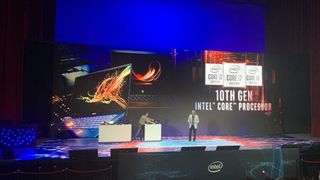Intel is finally revealing 10nm processors, starting with laptops
The 10th generation Ice Lake processors will touch down later this year.

After five generations, Intel is ditching the 14nm fabrication node... at least when it comes to laptops. Revealed at Computex 2019 in Taipei, Taiwan earlier today, the company's long rumored 10nm Ice Lake chips are—at long last—making their way to the best gaming laptops sometime later this year.
A key component in the Project Athena initiative, Intel aims to make laptops more intuitive with Ice Lake. Per its earlier announcements, Project Athena-compliant devices using the 10nm processors will offer "a new level of responsiveness," according to the Santa Clara chipmaker. "Touchless login," a nigh-instantaneous lock/wake solution is one part of this. Another is mobile gaming.
As TechRadar reports, integrated graphics in the 10th generation Ice Lake CPUs will be able to play back 4K HDR video in addition to running select triple-A games. Destiny 2 was provided as an example. Given the marketing for Project Athena, this comes as no surprise. In its sizzle reel debut back at CES, Intel showcased Anthem running on what resembled a Microsoft Surface Pro, with no charging cable in sight.
However, the on-paper specs for Ice Lake are sobering. For starters, you can expect Core i3 to Core i7 branding, which indicates to me that these are Y- and U-series chips. Those waiting on a 10nm die shrink of the more powerful H-series processors will have to be patient. Ice Lake core counts range from four to eight. Clock speeds will max out at 4.1GHz when cranked into Turbo Boost, while integrated graphics will have a 1.1GHz ceiling—twice that of generations prior.

The worst kept secret of Computex
For those disappointed by the lack of desktop chatter, Intel also 'unveiled' a new variant of its i9-9900K, namely the i9-9900KS. To be clear, it's not exactly an unveiling since Tom's Hardware reported on it days ago, but I digress. The important thing is there's a new processor, capable of achieving the coveted 5GHz frequency on all cores. While still limited to 8 cores and 16 threads, the boost clock alone does give the forthcoming AMD Ryzen 9 3900X a run for its money.
Moreover, the company said it's working on a fresh batch of Core-X HEDT processors, though language around these is nebulous. Of course, clock speeds will be higher and they'll introduce Intel Turbo Boost Max Technology 3.0, but other than that, details are murky. In the meantime, we can look forward to an assortment of new overclocking tools. Intel Performance Maximizer, for instance, lets you automate your overclocks.
And in the face of seemingly perpetual security flaws, if you still trust Intel enough to overclock your processor in your stead, I admire your bravery.
The biggest gaming news, reviews and hardware deals
Keep up to date with the most important stories and the best deals, as picked by the PC Gamer team.
Most Popular






